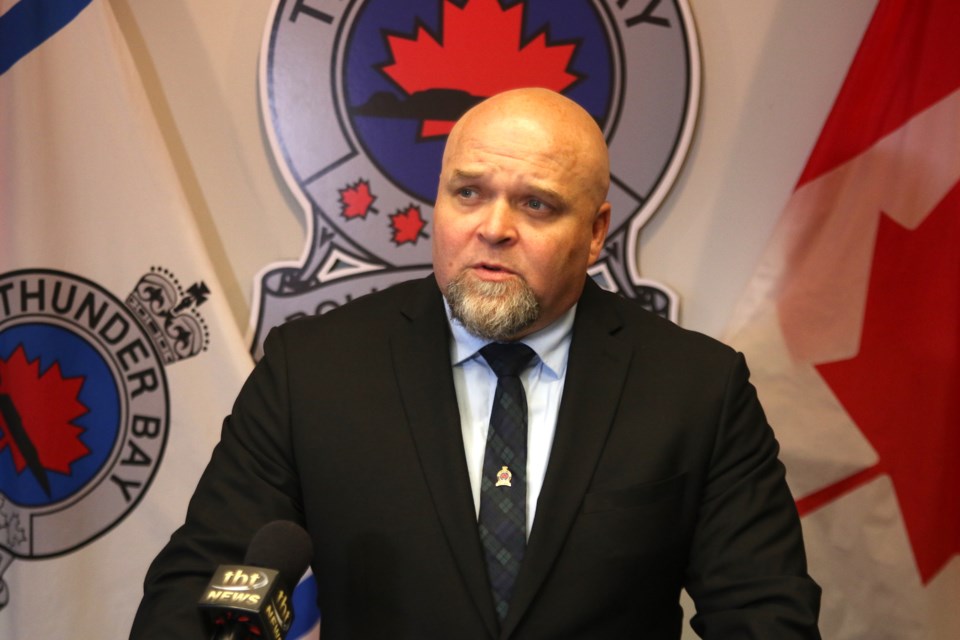THUNDER BAY — City police are expressing serious concerns over the announcement that all forensic autopsies may need to be done in Toronto starting in June.
It was disclosed last week that Thunder Bay Regional Health Sciences Centre has informed the Office of the Chief Coroner it will no longer be able to perform autopsies connected to police death investigations.
This will further strain the resources of city police, who are required to send forensic identification officers to Toronto for several days at a time when post-mortems take place at the provincial Forensic Services and Coroner's Complex.
"It will have a profound impact," said Det. Insp. Jeremy Pearson of the Thunder Bay Police Service's Criminal Investigation Branch, noting that this goes beyond the cost of sending officers away, as it also means suspected crime scenes must be kept secure by officers in the city while police await the results of autopsies.
"We also have to talk about the human cost, in terms of a grieving family who is waiting for answers, who have been through a traumatic experience already, and now they are waiting for their loved one to return so that they can pay their final respects," Pearson said.
As a general rule, he said, it might take two days to get an autopsy completed in Thunder Bay, but twice that long if the case is transferred to Toronto.
Since August 2021, about 300 posts-mortems related to city police investigations have been conducted out of the district, while 131 have been done in the city.
Pearson said conducting autopsies out of town has already created challenges, but requiring all procedures to be performed in Toronto will only increase police expenses and add to the workload of officers who must fill in while specialized officers are away for extended periods.
The Office of the Independent Review Director concluded back in 2018 that a forensic pathology unit is needed in Thunder Bay to handle local and regional medicolegal autopsies.
In its Broken Trust report, it also recommended the Ontario Forensic Pathology Service provide autopsy services compatible with cultural norms in Indigenous communities.
OIPRD reviewed the progress on the implementation of its 44 Broken Trust recommendations in 2020, and reported that the Ontario Forensic Pathology Services was having "ongoing discussions" with the Ministry of the Solicitor General to explore possible opportunities for a new building in Thunder Bay or for co-locating in existing health or justice facilities.
The ministry said last week that it is still looking into "options for localized autopsy services."
Acting Police Chief Dan Taddeo has said the issue should have already been resolved.
"I really question what efforts have been made for the simple reason that, again, going on five years where a forensic pathologist has not been identified or recruited, and that includes incentives to relocate and come to Thunder Bay, given the issues the Broken Trust report has correctly identified," Taddeo said in an interview with the Globe and Mail that was published this week.
Pearson echoed that, saying "It's unfortunate that in the case of five years, there haven't been advancements made ...All we can do is publicly re-state our support of the idea and the fact that we recognize the need for that service in this region."
He added that he knows the Thunder Bay Police Services Board is also strongly supportive.
A record-setting 15 homicide investigations were conducted last year in a community that also has one of the highest opioid-related death rates in Canada.
"Our city is increasingly seeing high rates of violent deaths, and overdose deaths, so we are seeing a number of complex death investigations that require a post-mortem, the forensic pathology, in order to advance the investigation or in some cases to provide the key information as to whether we are investigating a homicide specifically. Is this a traumatic death, or does it have another explanation?" Pearson said.
He said all deaths must be considered suspicious at the outset, until police are able to establish otherwise.
The sheer volume of the complex cases the city police service finds itself dealing with, Pearson said, makes the timing of the loss of forensic autopsies in Thunder Bay particularly unfortunate for all parties concerned.


.png;w=120;h=80;mode=crop)


